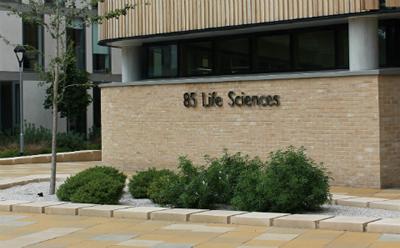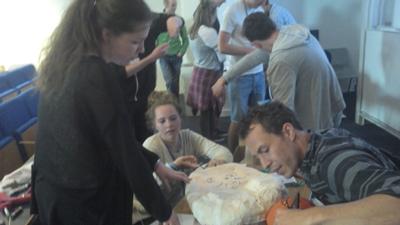Students are aided in their understanding of biomedical engineering

From 27-30th July, twenty-three students from across the UK attended a Biomedical Engineering course at the University of Southampton. Sponsored by the Institute of Physics and Engineering in Medicine (IPEM) and organised by The Smallpeice Trust, the four-day residential programme provided 15 and 16 year old students with an understanding about the captivating world of biomedical engineering and encouraged them to take up careers in this sector.
Over the duration of the course, students took part in a series of masterclasses and laboratory demonstrations covering topics including keyhole surgery simulations, measuring and delivering signals from the body for monitoring health and restoring activity and taking part in stem cell masterclasses. The students attended laboratory demonstrations organised by the University of Southampton teams from Health Sciences, the Centre for Human Development, Stem Cells and Regeneration and Bioengineering Sciences, which included motion analysis, ultrasound imaging and tissue engineering.
As part of the programme, guest biomedical experts came in from Salisbury District Hospital’s Functional Electrical Stimulation group, the Bath Institute of Medicine Engineering and the University of Liverpool’s Eye and Vision Sciences group. The students also visited Southampton General Hospital for a tour of the Centre for Human Development, Stem Cells and Regeneration and for masterclasses with Faculty of Medicine PhD students.
As well as working on the design, build and testing element of their projects, students developed life skills including teamwork, communication, problem solving, and time and financial management.
Social activities included a quiz, a barbeque, a trip to the local bowling alley and laser quest. On the final night, The Smallpeice Trust hosted a conference-style dinner and disco, where students and supervisors had the opportunity to socialise and share their experiences of the week.
Dr Nick Evans, from the University of Southampton’s Bioengineering Sciences group and Institute for Life Sciences commented, “This course is fanatastic, engaging way for students to interact with some of the University of Southampton’s talented research scientists. I think the students now realise that engineering isn’t just about making a better car, but is really important for designing medical technology that makes a real difference to patients’ lives. The enthusiasm of the activity leaders and facilitators really helped show how exciting this area of science is, and many of the students left the course strongly considering biomedical engineering as a career pathway. In fact some previous Smallpeice attendees are now postgraduate students at the University!&rdquo
Claire Fisher, spokesperson for The Smallpeice Trust also commented, “With thanks to IPEM, we have been able to offer students an insight into this fast-moving subject. Students have thought like engineers and have come up with solutions to problems faced by disabled, infirm and elderly patients. Students attending this course demonstrated a high level of enthusiasm and dedication to the subject. Judging by the students’ feedback it was clear that they had learnt a lot during their time on the course!”
The Biomedical Engineering course is organised by independent charity, The Smallpeice Trust, and is part of an on-going programme of residential courses to help young people aged 12 to 18 learn and develop skills in engineering, design, technology and manufacturing. Through running residential courses and STEM enrichment days, The Trust has reached out to 17,495 students across the UK in the past year.
The new course timetable for 2015 will be launched in the autumn school term. Places are allocated on a first come, first served basis. To find out more, visit www.smallpeicetrust.org.uk, or telephone The Smallpeice Trust on 01926 333200.
